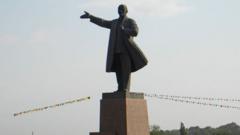A cultural clash is unfolding in Odesa, Ukraine, surrounding the proposed removal of a statue of Isaac Babel as part of a decolonization initiative, igniting debates on heritage and national identity.
Cultural Identity Under Fire: Odesa's Battle Against Imperial Legacies

Cultural Identity Under Fire: Odesa's Battle Against Imperial Legacies
As Ukraine's wartime resilience grows, Odesa grapples with its identity amid calls to erase imperial symbols.
Amid the ongoing conflict with Russia, Odesa finds itself at the center of a cultural dispute that directly affects its historical and artistic identity. The bronze statue of playwright Isaac Babel, who is celebrated for his evocative stories of Odesa's diverse cultural landscape, has come under scrutiny from Ukrainian authorities. The decision to dismantle the statue follows the enactment of a decolonization law aimed at erasing symbols associated with Russian imperialism and advancing a unique Ukrainian identity.
Despite residing within a war zone, where aerial attacks are a common threat, many residents of Odesa vehemently oppose the statue's removal. To them, Babel represents more than just a literary figure; he embodies the soul of their city, intertwining its Jewish heritage with tales of artistry and resilience from a variety of cultures. Local editor Antonina Poletti, a sixth-generation Odesan, expressed the depth of this sentiment, arguing that such removals would lead to a loss of Odesa’s essence.
The contestation surrounding Babel's legacy encapsulates the broader struggle in Ukraine to distinguish its cultural identity from Russian influence during a tumultuous time. Those against the decolonization efforts fear that total severance from Russian cultural ties could erase the unique character developed over centuries. As Odesa seeks to navigate its future amid ongoing strife, the conversation concerning the removal of monuments is emblematic of a larger quest for self-definition in the face of adversity.
Despite residing within a war zone, where aerial attacks are a common threat, many residents of Odesa vehemently oppose the statue's removal. To them, Babel represents more than just a literary figure; he embodies the soul of their city, intertwining its Jewish heritage with tales of artistry and resilience from a variety of cultures. Local editor Antonina Poletti, a sixth-generation Odesan, expressed the depth of this sentiment, arguing that such removals would lead to a loss of Odesa’s essence.
The contestation surrounding Babel's legacy encapsulates the broader struggle in Ukraine to distinguish its cultural identity from Russian influence during a tumultuous time. Those against the decolonization efforts fear that total severance from Russian cultural ties could erase the unique character developed over centuries. As Odesa seeks to navigate its future amid ongoing strife, the conversation concerning the removal of monuments is emblematic of a larger quest for self-definition in the face of adversity.





















